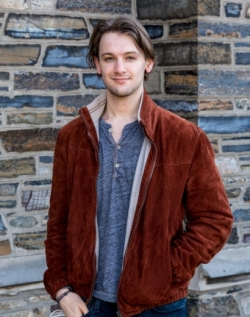
- About
- Education
- Research
- Thought Leadership
- Engagement
- News & Events
Back to Top Nav
Back to Top Nav
Back to Top Nav
Back to Top Nav
Back to Top Nav
New Energy: Conversations with Early-Career Energy Researchers is an online series featuring graduate, post-doctoral, and other early-career researchers sharing their discoveries and perspectives on energy-related topics. From policy to analysis to emerging technology, this series will give anyone interested in energy the opportunity to learn from the rising stars in the field.
The New Energy series is on hiatus for the 2025-2026 academic year. You can view recordings of past talks below.
Next-Generation Geothermal Power and its Role in the Energy System
Wilson Ricks, Fellow, Mechanical and Aerospace Engineering, Princeton University
Wednesday, May 14, Noon – 1 p.m. | Online event via Zoom
View a recording of the Wilson Ricks talk
Abstract
Geothermal power is an established source of renewable, round-the-clock electricity and heat, but accounts for only a tiny fraction of global energy consumption today due to its dependence on unique geologic conditions. Next-generation geothermal technologies under development today, including enhanced geothermal systems (EGS), have the potential to make much greater contributions to decarbonization by vastly expanding the geographic range where geothermal power generation is possible. In this talk I will discuss recent research that employed energy systems modeling methods to optimize the design and operations of EGS power plants and explore their potential value and role in future electricity systems. I will focus in particular on the potential for EGS to provide long-duration energy storage via modulation of well flow rates.
About Wilson Ricks

Wilson Ricks is a postdoctoral researcher in the Zero-carbon Energy systems Research and Optimization (ZERO) Laboratory at Princeton University, where he recently earned his Ph.D. His research uses optimization-based energy systems modeling tools to explore the impacts of technologies and policies on the decarbonization of the energy sector. His primary areas of focus include next-generation geothermal power and temporally granular emissions accounting.
Kate Burrows, Assistant Professor, Department of Public Health Sciences, University of Chicago
Wednesday, April 30, Noon - 1 p.m. | Online event via Zoom
View a recording of the Kate Burrows talk
Abstract
The link between elevated ambient temperature and mental health conditions has been increasingly well documented. However, the temporal dynamics of this relationship, including diurnal variation and lag periods, remain poorly understood. This is in part due to a historic lack of highly spatially and temporally refined data. In this time stratified case-crossover study, we investigated the association between hourly temperature exposure and psychiatric emergency department (ED) visits in Massachusetts using data from the Boston Emergency Services Team (2005-2019). Using a new exposure model, ambient temperature was estimated at 1x1km spatial resolution for each individual's residential location for each of the 24 hours preceding their ED visit. Preliminary results showed non-linear associations between ambient temperature and psychiatric emergencies that increased with longer exposure periods, with 0-24 hours cumulative exposure showing the strongest association compared to 1-hour immediate exposure. Significant diurnal variation was also observed, with the strongest temperature-PES associations for ED visits occurring during morning hours and evening hours, while risk was lower for afternoon and night ED visits. These preliminary results indicate that heat impacts accumulate over the course of a day, which may help elucidate potential causal mechanisms. Findings also suggest the importance of considering temporal patterns when implementing heat-health interventions and provide insights for clinical resource allocation during periods of extreme heat.
About Kate Burrows
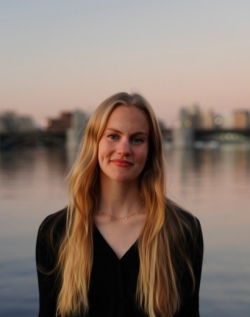
Dr. Kate Burrows is an environmental health scientist whose research focuses on the relationship between climate- and weather-related extremes and public health. She has interdisciplinary training in environmental epidemiology (PhD, Yale University School of the Environment) and social-behavioral sciences (MPH, Columbia University, Mailman School of Public Health), which allows her to investigate global health issues from a unique perspective that incorporates sociocultural determinants of health and environmental exposures.
Dr. Burrows is a mixed-methods scientist. She conducts qualitative and community-based research as well as quantitative research using big data at the national level. Prior to joining the University of Chicago, Dr. Burrows was a Voss Postdoctoral Fellow at the Institute at Brown University for Environment and Society.
Felipe Verastegui-Grunewald, PhD Candidate, Columbia University
Wednesday, January 22nd, 12 - 1 PM
Abstract: What strategy should sustainable investing funds adopt to reduce emissions without inducing firms to excessively engage in the reallocation of industrial pollution? In this talk, we address this question through a competitive equilibrium model. We show that the strategy choice critically determines the distribution of reallocation risk across the pool of productive assets. Our model predicts that complying with sustainable targets can affect downstream consumption markets, creating strategic complementarity or substitution in compliance decisions, depending on the mass of environmentally concerned investors. Financing frictions, then, lead to leakage trades: assets shift from compliant to non-compliant firms, with negative implications for clean technology adoption and welfare. Limiting only to conventional sustainable investment strategies - such as green screening - is suboptimal under worst-case scenarios of ex-post firm-investor matches in the presence of leakage buyers. Unconventional strategies, like reduction or investment screening, can effectively mitigate the reallocation of industrial pollution and induce a larger degree of clean technology adoption.
About Felipe Verastegui-Grunewald
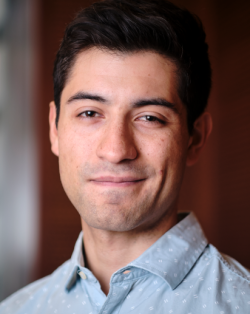
Felipe Verastegui-Grunewald is a third-year Ph.D. candidate in the Department of Industrial Engineering and Operations Research at Columbia University. His research centers on market design and optimization within power and energy systems, with a keen interest in financial markets. Currently, his work explores resource allocation, algorithmic pricing, and contract design under long-term climate risk, as well as financial intermediation amidst externalities. Felipe is also affiliated with the Center for Digital Finance and Technologies and was in the inaugural cohort of the Global Energy Fellows program at Columbia's Center on Global Energy Policy. Before joining Columbia, he held an adjunct faculty position at Pontificia Universidad Católica de Chile, served as a technology specialist in the Chilean Ministry of Energy, and co-designed and taught a course on Chilean Energy and Climate Policy at Stanford University. Felipe was awarded a Fulbright Scholarship and has collaborated closely with Independent System Operators (ISOs), governments, and trade associations, contributing to energy market design and the implementation of climate policy initiatives.
Laura Castro-Diaz, Assistant Professor, School for the Environment, University of Massachusetts Boston
Wednesday, February 19th, 12 - 1 PM
View a recording of the Laura Castro-Diaz talk
Abstract: This presentation examines the vital role of participatory research in promoting energy justice, asserting that participatory research frameworks and methods are crucial for closing the gap between theory and practice in tackling energy inequities. I showcase a case study from the Brazilian Amazon to demonstrate how participatory research reveals energy injustices and effectively addresses specific energy challenges. I will outline the key principles of participatory research in energy justice.
About Laura Castro-Diaz
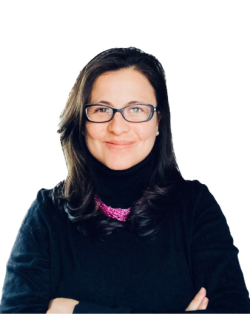
Laura Castro-Diaz is an assistant professor at the School for the Environment at UMass Boston. I conduct community-based research to address environmental injustices (Food, water, and energy). I employ diverse collaborative and community-based frameworks and methods to examine the implications and responses to water and energy injustices at different scales, from the individual to the global scale.
Megan Egler, Postdoctoral Fellow, Institute of Integrated Energy Systems, University of Victoria
Wednesday, March 5, 12 - 1 PM
View a recording of the Megan Egler talk
Abstract: Whether it's the Premier of Canada's oil country reviving a decades-old slogan to portray climate action akin to people 'freezing in the dark', or a solar developer leveraging the harmful legacies of coal mining in Appalachia to promote new solar projects, powerful narratives are being wielded to shape energy futures - and often in ways that reinforce existing power dynamics. Drawing on her research and experiences in historical fossil fuel producing regions across Canada and the US, Dr. Egler's talk will explore how energy capital exploits the people, histories, and landscapes of these regions to control narrative and define the terms of energy's future.
About Megan Egler
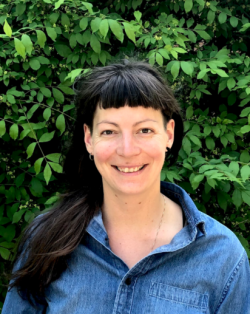
Megan Egler is a postdoctoral fellow in the School of Public Administration and the Institute for Integrated Energy Systems at the University of Victoria. Megan's research deals with the political economies and critical geographies of energy and extraction, with research focusing on the just design and implementation of energy and climate policies; the prefiguring potential of energy technologies and initiatives; and the cultural politics of fossil fuel regions. She has contributed research and consulted on programs and policies dealing with fossil fuel liabilities and major energy infrastructure and mining projects in Canada and the USA.
Watch a recording of this talk
In some low-lying coastal areas around the world, decision-makers are beginning to consider "managed retreat" of human populations to adapt to sea-level rise. One of the main challenges in designing a managed retreat strategy is determining when to trigger retreat. Decision-makers lack tools and scientific understanding to evaluate whether the benefits of interim response strategies, like beach nourishment, outweigh the costs of waiting longer to trigger retreat.
In this talk, Thayer School of Engineering at Dartmouth PhD candidate Prabhat Hegde will contextualize the coastal beach nourishment problem within the umbrella of decision analyses frameworks for climate change adaptation. He will demonstrate how considerations of uncertainty and multiple objectives improve upon existing decision-making practices, drastically changing expected outcomes and the recommended timing of retreat. A Q&A following the presentation will be moderated by Dartmouth Research Scientist Hunter Snyder.
About Prabhat Hegde
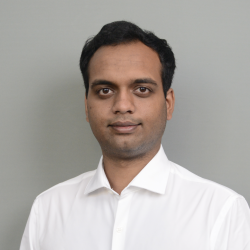
Prabhat Hegde is a graduate research assistant at the Thayer School of Engineering. His research touches upon various aspects of optimizing energy and transportation systems for effective city-scale planning against climate risks. Professionally, he has had various industrial research-focused experiences in the past from the renewable energy, downstream oil & gas, and automotive sectors. In his short professional career so far, he has had the opportunity to work across India, France, Germany and the United States, mastering intercultural nuances and effectively deploying his multilingual ability to communicate technical content in different languages. He is also an avid data science enthusiast.
Watch a recording of this talk
About the Talk
In 2020, the State of Colorado launched its Just Transition Action Plan, which identifies different communities across the state that need, and are currently undergoing, transitions away from fossil fuel towards more sustainable industries (renewable energy being one of several). Additionally, the State has released two Greenhouse Gas Pollution Reduction Roadmaps, and the Governor released a Roadmap to Colorado's Future, each one articulating policy priorities through 2026. These plans and roadmaps outline an ambitious undertaking and present an opportunity to study the 'transit' of Colorado's Just Transition, which is to say the process, both discursive and material, by which society will (ideally) be more equitable, as it is unfolding.
Utilizing an experimental political ecology approach, one that aims to engage directly in the process of transition, Professor Harris will discuss the experiences of three transition communities, each one dealing with the closure a coal-fired power plant. These plants are in various stages of termination, disrepair, innovation, and restoration. They represent a vision of 'transit' in which the future is being actively assembled, and each site contains the material (metal, fiberglass, and dust) and discursive (anxiety, desire, and optimism) components of transition. Taking cues from the successes of a "Tier One" community, a community on the frontlines of transition as defined by the state's action plan, Harris will conclude with some lessons about how a transition away from fossil fuels may truly be just.
About Dylan Harris
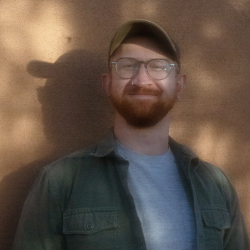
Dylan M. Harris is an assistant professor of geography and environmental studies at the University of Colorado Colorado Springs (UCCS). His work focuses on the stories we tell (and don't tell) about socioecological change, focusing specifically on the procedural justice elements of climate and energy justice. He is interested in work that exists at the intersection of change, drawing from what he terms experimental and speculative political ecology to critically study the unequal power structures informing many "transition" projects (e.g., carbon offsets) while also aiming to disrupt them, pointing towards more equitable possibilities, through interventionist research.
Talks take place from 12-1 pm ET. Zoom registration links are below.

"Microwaving Glass: Harder Than We Thought"
Ralph Behrend, Research Associate, Technical University Bergakademie Freiberg
About the Talk
Industrial heating is responsible for around 1/3 of the world's energy demand. Most of the necessary heat is supplied by combustion of natural gas, coal, and oil. For carbon neutral production a retrofit to renewable heat sources will be key. While hydrogen as replacement fuel could be possible, it would be even better to go all electric. But high temperature processes are hard to retrofit with conventional electric heaters. For some processes, like glass melting, microwave heating is a viable alternative: It enables high energy densities, extremely fast heating, and high temperatures. It is also very complicated to implement on large scale. In this New Energy talk, Dr. Behrend will share his recent research on the topic.
About the Speaker
Ralph Behrend is a Research Associate and work group leader for thermo process engineering at the professorship for gas and heat technology at the Technical University Bergakademie Freiberg. He received his Ph.D. in mechanical engineering from the Technical University Freiberg in 2023. Ralphs research is centered around high temperature processes of all kinds. Microwave heating has been part of his portfolio since his master thesis and has become the basis for glass melting applications, CFRP recycling and more. Other research includes refractories and insulation materials in high temperature processes and gasification and pyrolysis processes.
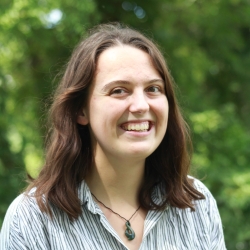
"How to Kill a Powerline: Utility-on-Utility Violence and Electricity Capital in Energy Infrastructure Disputes"
Maddy Kroot '19, PhD candidate in Clark University's Graduate School of Geography
View a recording of this talk.
About the Talk
The concept of just energy transitions pushes us to pursue rapid decarbonization while also centering issues of justice, equity, and democratic participation in energy decision-making. However, in practice, these mandates often appear at odds, with participatory practices widely seen as endangering fast policies for decarbonization through discourses of climate NIMBYism, or the "Not-In-My-Backyard" movement.
This talk explores a different driver in project delays and cancellations: "utility-on-utility violence." Drawing on doctoral work on two controversial high-voltage transmission lines in northern New England, the talk explores how incumbent electricity capital effectively weaponizes the mandate for public participation in infrastructure permitting to block new energy sources from entering the grid and jeopardizing the profitability of existing assets. Rather than "astroturf" opposition, incumbents amplify the resources of pre-existing public opposition stemming from poor project design and community outreach, assisting small rural communities in slowing or cancelling billion-dollar projects. In turn, this utility-on-utility violence provides cover for capital, funneling blame for decarbonization delays towards uncooperative publics rather than utility interference in the regional electricity market.
About the Presenter
Maddy Kroot is a PhD candidate in Clark University's Graduate School of Geography. Her dissertation project looks at community opposition to new high-voltage transmission lines in northern New England, focusing on the Northern Pass project in New Hampshire and the New England Clean Energy Connect project in western Maine. These transmission lines are intended to increase imports of hydroelectricity from Hydro-Quebec to meet decarbonization targets in Massachusetts. Using spatial justice as a lens, she considers how the dual mandates of decarbonization and energy democratization lead to "green-on-green" conflict in energy governance when the regional and planetary benefits of grid decarbonization and reduced carbon emissions come into friction with localized impacts to landscape conservation, rural livelihoods, and sense of place. Maddy is a National Science Foundation Graduate Research Fellow and a Jack Kent Cooke Foundation Graduate Scholar, and holds a B.A. in Geography and Linguistics from Dartmouth College.
Talks take place from 12-1 pm ET via Zoom. Registration links are below.
The Climate Adaptation and Mitigation Clash: A 3-Dimensional Trade-off Analysis between Efficiency, Cost, and Emissions for a Northeast Urban District Energy Systems that Incorporates Distributed Energy Resources
Benedict Veraga, PhD Candidate in Electrical Engineering at George Washington University
View a recording of this talk.
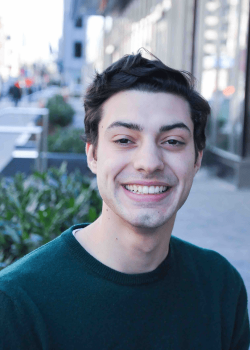
About the Talk
The 2023 report by the Intergovernmental Panel on Climate Change underscores the critical need for both adaptation to our changing climate and reducing further environmental impacts. This presentation focuses on the trade-offs among cost, efficiency, and emissions in a northeastern urban energy system incorporating renewable sources and storage solutions. It reveals concerning findings about conflicting objectives. The presentation will describe the model that was built and proposes a methodology to achieve a balanced compromise between cost, energy efficiency, and emissions, aligning climate adaptation with mitigation goals.
About the Speaker
Benedict Vergara is a Ph.D. candidate in Electrical Engineering at George Washington University (GWU), specializing in power and energy for smart cities. He applies optimization and machine learning methods to address energy scheduling challenges in cities with varied energy generation and storage capabilities. Additionally, Ben serves as an Adjunct Instructor at GWU, leads the university's Association of Energy Engineers (AEE) chapter, and is an Advanced Energy Group fellow, all with the goal of promoting energy literacy and fostering interdisciplinary collaboration.
Governing Green Transformative Innovation
Tyler Hansen, Research Associate, Dartmouth Environmental Sciences
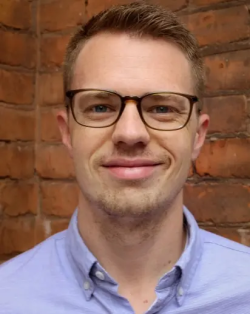
About the Talk
Transformative innovation is the process of developing and implementing new ideas that lead to structural societal change and green transformative innovation directs the new ideas and structural change at the myriad challenges to climate stabilization. In this New Energy talk, Tyler Hansen, Research Associate at Dartmouth College, will discuss a recent paper that takes as its starting point that governments have played, and will continue to play, a massive role in transformative innovation. In this paper, the research team applies one emerging approach to green transformative innovation policy and governance—mission-oriented innovation policy—to a qualitative case study on the Danish energy islands, an early-stage green innovation project with the potential to transform offshore wind deployment, transmission planning and operation, and power-to-X development (conversion of green power to hydrogen and other chemicals). The paper then focuses on identifying and understanding the challenges for governance, and use our results to inform the development of the Danish energy islands, as well as the mission-oriented innovation policy literature.
About the Speaker
Tyler Hansen is a Research Associate in the Department of Environmental Studies, advised by Professor Elizabeth Wilson. He received his Ph.D. in economics from the University of Massachusetts Amherst and worked for two years as a postdoctoral researcher at the Technical University of Denmark, Department of Wind and Energy Systems. Tyler's research revolves around the economics, political economy, and governance of clean energy transitions, with a particular focus on offshore wind energy. Some of his current projects include a case study on the Danish energy islands to explore the challenges to governing green socio-technical transformations, the development of a supply chain approach for estimation of local economic benefits from wind energy, stakeholder engagement in the offshore wind sector to specify key challenges for offshore wind development in the U.S., and a review and assessment of the claim that climate stabilization requires economic degrowth.
View a recording of this talk.
Spillover Benefits from Electric Vehicle Charging Stations to Local Businesses
Qingran Li, Assistant Professor at Clarkson University in the David D. Reh School of Business and the Institute for a Sustainable Environment
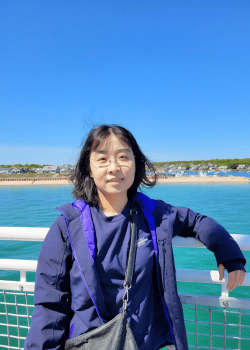
About the Talk
Expansion of electric vehicle charging stations (EVCS) fosters EV adoptions, leading to economic benefits to EV drivers and long-term environmental gains. These benefits, however, are not directly received by charging site hosts. In this talk, Qingran will discuss her research on local benefits of EVCS in terms of increased revenues for businesses near new EVCS establishments. She will also talk about how these benefits are distributed across different communities.
About the Speaker
As a researcher in the interdisciplinary field of environmental economics, Qingran Li finds it important to closely tie her research to policy-related questions concerning a variety of stakeholders. The need to communicate scientific findings to regulators and the general audience constantly reminds her to explore and practice analytical tools that can deliver robust results. The challenge of policy-making in a world characterized by increasing uncertainties and environmental risks motivates Dr. Li's research about integrating climate change dynamics, human behavioral responses, and technology diffusion into long-run policy design.
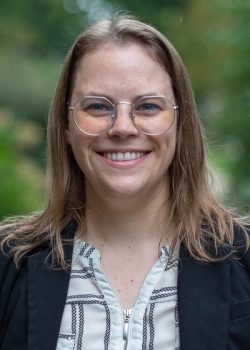
"Investigating the Impact of Climate Change on Electricity Demand Through Domain-informed Machine Learning."
Renee Obringer, Assistant Professor of Energy and Mineral Engineering, Penn State University
Moderator: Dr. June Lukuyu, University of Washington
About the Talk
Soaring temperatures and increased frequency of heatwaves have changed the way many people use electricity, often leading to higher consumption during the summer months. This trend is likely to continue as climate change progresses and temperatures increase. In order to ensure our electricity grid is prepared for these changes, it is important to develop accurate predictive models that account for climate-induced shifts in demand. Here, Dr. Obringer will present results from two studies that leverage state-of-the-art data analytics to investigate the impact of climate change on electricity demand. The first study focuses on city-wide demand, while the second aims to evaluate changes in household-level air conditioning use. Together, these studies demonstrate the impact climate change is likely to have on the larger electricity grid, as well as the implications for residents. Understanding these shifts is a critical step to improving the resilience of our electricity infrastructure in the face of climate change.
About the Speaker
Dr. Renee Obringer is an interdisciplinary researcher primarily interested in socio-technical systems. In particular, she applies computational techniques ranging from machine learning to agent-based modeling to explore the relationship between people, climate, and infrastructure systems. Currently, she is an assistant professor in the John and Willie Leone Family Department of Energy and Mineral Engineering at Penn State University. Her primary research aims to better understand the impact of climate change on energy systems by leveraging data analytics and other computational techniques. At Penn State, she is also affiliated with the Earth and Environmental Systems Institute and the Institute for Computational and Data Sciences.
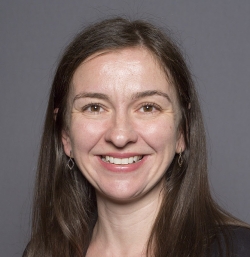
"In the Vault: The Roles of Public Green Banks in the Transition to Net-zero Emissions. Case Studies of Australia, New Zealand, and the United States."
Chell Lyons, Sir Roland Wilson PhD Scholar at Australian National University
About the Talk
Decarbonizing the global economy requires a significant increase in funding for low-carbon, climate-resilient infrastructure. It is widely recognized that current levels of investment are insufficient, and need to scale up rapidly to meet the temperature goals of the Paris Agreement. Green Banks, a relatively new form of public financial institution, were developed to address this issue by accelerating investment and "crowding in" private finance. This presentation adopts a case study approach drawing on expert interviews, to elicit information on the investment governance and evaluation processes of four Green Banks; Australia's Clean Energy Finance Corporation, New Zealand Green Investment Finance, the New York Green Bank and the Montgomery County Green Bank. It concludes with lessons for other public financial institutions seeking to leverage private finance in the investment transition to net zero emissions.
About the Speaker
Chell Lyon's PhD research explores the role of public investment in the transition to net zero emissions. She examines how public banks, particularly green banks, evaluate investment decisions, with a focus on implications for Australian policymakers.
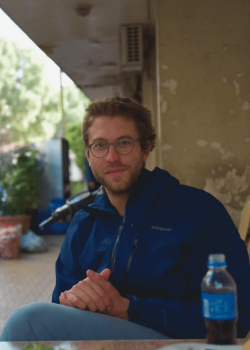
"Does Grid Collapse Accelerate the Energy Transition? Lessons from Lebanon's Electricity Crisis."
Camillo Stubenberg, PhD Student, Cornell University
View a recording of this talk.
About the Talk
In June 2022, a staggering 150,000 tons of solar panels arrived at the port of Beirut—equating to more solar capacity than Lebanon had imported over the preceding decade. Once lagging behind Mediterranean counterparts, Lebanon's energy landscape transformed rapidly due to the 2021 economic crisis and subsequent severe fuel shortages. The nation's established power entities, including the state utility Electricité du Liban and the infamous generator mafia, found themselves incapacitated without fossil fuels. Drawing from recent dissertation fieldwork, Cornell's Camillo Stubenberg will explore this swift transition to off-grid solar energy. Lebanon's experience serves as a compelling case study in a world where fossil fuel supply chains and centralized grids are increasingly fragile.
About the Speaker
Camillo Stubenberg is a PhD candidate in the Department of Global Development at Cornell University. His dissertation research examines the social aspects of the rushed transition towards off-grid solar energy in Lebanon. For his project "Under the Patronage of the Sun? the techno-politics of Lebanon's solar energy boom" he recently completed 11 month of ethnographic field research. Prior to coming to Cornell, Camillo worked worked as a consultant in rural development and impact research in the tri-border region of Austria, Switzerland and Germany. He earned a B.Sc. in environmental resource management from the University of Applied life Sciences in Vienna, as well as a BA+MA degree in International Development at the University of Vienna.
Ker-hsuan Chien, Assistant Professor Institute of Technology Management, National Tsing Hua University
"Powering Up the Green Supply Chains: The Sustainability Chain Governance and the Marketization of Renewable Energy in Taiwan"
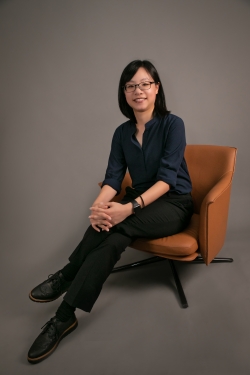
In this talk, Dr. Chien will discuss her recent paper that looks at how 2050 zero emissions goals have put tremendous pressure on Taiwan's manufacturing sector to decarbonize its energy sources. In the paper, Dr. Chien focuses on sustainability chain governance, scrutinizing the formation, codification, and implementation of renewable energy procurement, and its impacts on the renewable energy market at the production end of supply chains.
By following the transactions guided by global brands (e.g. Apple, Google etc.) and global initiatives (e.g. RE 100), and their impact on the emerging renewable energy market in Taiwan, Dr. Chien aims to answer three critical questions about sustainability chain governance. Firstly, how was supply chains' decarbonization guided by the rules and norms formed by the global disclosure regimes? How was decarbonization translated differently by the global brands and their suppliers? Secondly, how was renewable energy made into a tradable commodity through the marketization process of Taiwan's energy system? Finally, how have the materialities of renewable energy conditioned the marketization of renewable energy in Taiwan?
Through focusing on the nexus of global sustainability chain governance and the marketization of renewable energy, Dr. Chien demonstrates that the renewable energy market has become the new site of struggle between local renewable project developers, the grid operator, local/global renewable energy buyers, and the state.
About the Speaker
Ker-hsuan Chien is an assistant professor at the Institute of Technology Management at National Tsing Hua University. Her research interests are energy transition, industrial policy, and regional development.
Azucena Castro, Swedish Research Council Postdoctoral Researcher, Stockholm Resilience Center, Stockholm University; Postdoctoral Scholar, Department of Iberian and Latin American Cultures, Stanford University
"Energy Justice from Below: The Role of Artivisms from the Sacrifice Zones for a Situated Political Ecology of the Energy Transition. Insights from La Guajira, Colombia and the Argentinian Patagonia"
azucena_foto1.jpg
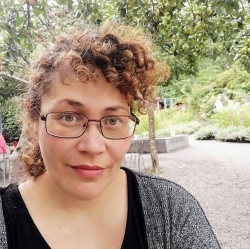
Azucena Castro
The national projects to transition to clean energy forms in Latin America are not devoid of conflicts. In many cases, these projects entail new forms of colonialism and extractivism that intersect with traditional ones as coal mining. These conflicts are connected with the formation of energy imaginaries around territories that are perceived as sacrifice zones to generate energy for the nation and international markets. In this talk, Azucena Castro will address how those imaginaries are formed and sustained by hegemonic discourses but also challenged by local forms of art and activism (artivisms) that demand energy justice in the context of the energy transition. While wind and water energy have been portrayed as the solution to the climate crisis, there are many conflicts arising in regard to Eolic parks and hydroelectric dams all over Latin America. Castro will draw insights from two case studies on renewable energy forms in Latin America: La Guajira in Colombia, designated as "the epicenter of Colombia's energy transition" for Eolic Energy, and the Argentinian Patagonia, viewed as "Patagonia-energy" for the installation hydroelectric plants. By discussing the engagement of local activist art with energy from a political ecological perspective, she will show how local needs and cosmologies are highlighted as crucial to attain an energy justice from below, i.e., a just and sustainable energy transition that considers biocultural diversity, technological sovereignty, and expanding views on energy beyond electricity.
About the Speaker
Azucena Castro is Swedish Research Council Postdoctoral Researcher at Stockholm Resilience Center, Stockholm University and a Postdoctoral Scholar at the Department of Iberian and Latin American Cultures, Stanford University. Her research revolves around environmental and energy humanities with focus on Latin American and Caribbean cultural studies.
Related Links
Project: "No aire, no te vendas. Energy Sovereignty and Collective Creation in the Context of the Eolic Parks in la Guajira" (with Juan Reina-Rozo and Agustín Neko Epiyú), funded by Intersecting Energy Cultures Working Group (Penn Program in Environmental Humanities).
Forthcoming publication (Spring 2023): Castro, Azucena and Castro, Hortensia. "Geographical Imaginaries around Santa Cruz River: Creative Materialities and Territorial Activisms in the Capitalocene." Espacios de Crítica y Producción. Revista de la Facultad de Filosofía y Letras, Universidad de Buenos Aires (In Spanish).
Wednesday, January 25
"Understanding Climate-Economy Impacts and Feedbacks Under Deep Uncertainty"
Christopher Callahan, PhD. student, Dartmouth College
Moderated by Richard Howarth, Dartmouth Professor of Environmental Studies
About the Talk
Understanding the economic impacts of climate change is essential to designing climate mitigation and adaptation strategies, but the magnitudes and mechanisms of these impacts are poorly constrained, as are the contributions of individual actors to these impacts. In this talk, Callahan will discuss his research understanding and quantifying the economic growth impacts of extreme climate events, isolating the roles of individual emitters in contributing to historical climate damages using simple climate model simulations, and illustrating coupled feedbacks between climate adaptation and global warming. Collectively, this work aims to build a fuller understanding of the coupled climate-economy system in a warming world.
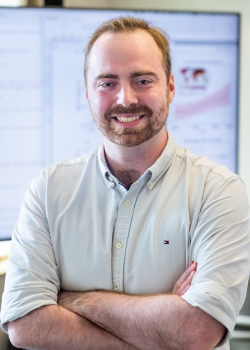
About the Presenter
Chris Callahan is a PhD candidate and NSF Graduate Research Fellow at Dartmouth College in the EEES program, working with Dr. Justin Mankin and the Climate Modeling and Impacts Group. His research focuses on the economic and social consequences of climate change. He uses a wide range of tools, from simple and complex climate models to econometric regression techniques, to understand the relationship between extreme climate events and outcomes such as human health and economic growth. His work aims to inform policy discussions over climate mitigation, adaptation, and loss and damage funding, as well as decisionmaking tools such as the social cost of carbon.
Links
Website
Google Scholar
Twitter
Wednesday, February 8
"Carbon Capital: The Moral Metrics of Energy Finance"
Sean Field, Research Fellow, University of St. Andrews
Moderator: April Salas, Executive Director, The Arthur L. Irving Institute for Energy and Society at Dartmouth
About the Talk
Drawing on ethnographic fieldwork with energy financiers in Houston, Texas, Sean Field explores how experts use a lexicon of models and metrics to conceptualize and construct allegories about future hydrocarbon projects and companies. Dr. Field shows that allegorical narratives built with this lexicon advance a kind of energy ethics – distinguishing what is good and advocating for particular energy futures. As the energy industry pivots toward renewables, Dr. Field argues that these metrics, models and allegories are coming to bear on new forms of extraction. This talk is based on a recent paper, Carbon Capital: The Lexicon and Allegories of US Hydrocarbon Finance.
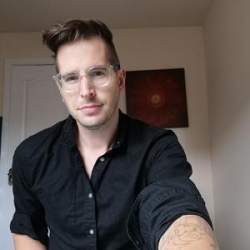
About the Presenter
Sean Field is a Research Fellow at the Centre for Energy Ethics and in the Department of Social Anthropology at the University of St Andrews. Since late-2018, his research has focused on how financial professionals ethically and financially value energy. His ethnographic work explores the calculation of risk, the performance of financial expertise, the valuation of energy resources, and the integration of ESG into investment practices.
A key implication of his research is that the world of finance is central to the materialization of our collective energy and anthropogenic landscapes. Dr. Field's project is part of the larger Energy Ethics research project led by Dr. Mette High and funded by the European Research Council.
Links
Google Scholar
LinkedIn
Wednesday, February 22 | 12- 1 p.m.
"Early-life Exposure to Clean Cooking Transitions: Impacts on Cognition and Health"
Emily Pakhtigian, Assistant Professor, Penn State
Moderator: JT Erbaugh, Research Associate, Dartmouth Department of Environmental Studies
Between 2007 and 2013, the Indonesian Government instituted a national cooking fuel conversion program, transitioning households away from biomass and kerosene and towards liquid petroleum gas (LPG) through adjustments to kerosene and LPG subsidies. In this talk, Penn State's Emily Pakhtigian will discuss the household and individual impacts of this large-scale cooking transition. In particular, she will focus on the impacts of early-life policy-induced improved indoor air quality on children's cognitive development and health. As countries around the world look to improve climate and health through clean energy transitions, understanding the social impacts of such policies is essential for developing efficient, equitable, and sustainable policies.
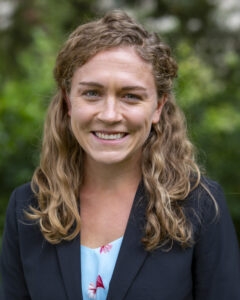
About the Presenter
Emily Pakhtigian's research examines the causes and consequences of human interactions with the natural environment. Her research interests include environmental health, water and sanitation, air pollution, human capital accumulation, and water resource management. Dr. Pakhtigian's recent research includes work to understand the processes by which households adopt and utilize environmental health technologies, the health and educational consequences of ambient air pollution exposure, and the economic implications of water resource management. She has a variety of primary data collection projects related to environmental resource management, water and sanitation, and environmental health information provision. Dr. Pakhtigian's work focuses primarily on contexts in low- and middle-income countries including Bangladesh, India, Nepal, and Indonesia. She also studies applications of domestic environmental policy.
Dr. Pakhtigian holds a Ph.D. in public policy, with a concentration in economics, from the Sanford School of Public Policy at Duke University. She has an M.A. in economics from Duke University and B.A.'s in economics and political science from Moravian College.
Links
Wednesday, March 8
"Productive Uses of Decentralized Renewable Energy"
Vivek Shastry, PhD Student, University of Texas, Austin
Moderator: Mark Laser, Associate Professor of Engineering, Thayer School of Engineering at Dartmouth
View a recording of this talk.
About the Talk
For over a billion households today, electricity is still unavailable, unreliable, or unaffordable. Historically, the use of stand-alone decentralized renewable energy (DRE) for rural electrification primarily focused on powering lights and mobile chargers. In the past decade, the electrification agenda has shifted to a demand-centric approach, focusing on understanding how rural livelihoods, healthcare, and education can be powered by DRE, enabled by a supporting ecosystem. In this talk, Vivek Shastry will present findings from an in-depth field study of rural entrepreneurs in southern India who are using solar powered appliances for a range of rural livelihoods and businesses. Specifically, he explores the market and non-market factors that influence entrepreneurs' access to these solutions, and the mechanisms through which they contribute to building their resilience to future livelihood and climate shocks.
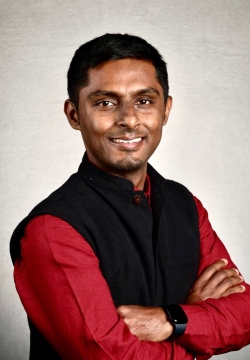
About the Presenter
Vivek Shastry is passionate about facilitating inclusive development through sustainable energy solutions. As a doctoral candidate in Public Policy at the University of Texas at Austin, his current work explores the intersection of energy access, primary health care, rural livelihoods, and gender. Prior to pursuing his doctorate, he earned master's degrees in Sustainable Design, and Community and Regional Planning from the University of Texas at Austin and worked with the policy and planning group at SELCO Foundation. He has traveled extensively in rural India and worked on decentralized renewable energy projects from implementation, research, and policy perspectives.
Links
Google Scholar
LinkedIn
Twitter
Website
Wednesday, September 14
"Lithium-ion Battery Material Circularity: Reduce, Reuse, Repurpose, and Recycle"
Jessica Dunn, Senior Analyst, Union of Concerned Scientists
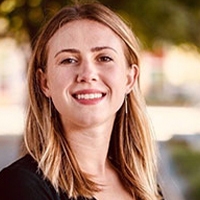
The lithium-ion battery is a key enabling technology for transport decarbonization. While substantial impact reduction can be achieved, their use has also sparked concern due to the use of critical materials such as cobalt, nickel, and lithium. Through the circularity principles of reduce, reuse, repurpose, and recycle, resource conservation and impact mitigation can be achieved. This presentation will discuss current research, industry development, and policy which supports lithium-ion battery material circularity.
Dunn is currently finishing her Doctorate in Energy Systems at the University of California, Davis. During her studies she was a co-facilitator for the California Lithium-ion Battery Recycling Advisory group and a private consultant for the International Energy Agency on topics related to energy technologies and battery systems. In addition, she published several academic journal articles about using industrial technology methods to forecast and evaluate the impact of battery recycling.
Prior to pursuing her doctorate, she earned a master's degree from University College London in Economics and Policy of the Environment and Energy and worked in the energy and environmental consulting industries.
Wednesday, September 28
"Examining Electricity Consumption and Complementary Infrastructure for Small and Medium Enterprises in Kenya"
Bob Muhwezi, PhD Candidate, University of Massachusetts, Amherst
Moderator: Erin Mayfield, Hodgson Family Assistant Professor of Engineering
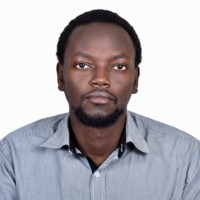
In Kenya, between 2010 and 2015, the number of Small and Medium Enterprises (SMEs) connected to the grid increased by over 60%. Despite this substantial increase, little is known about the behavioral patterns or conditions that contribute to increased electricity consumption among these SMEs. In his talk, Bob Muhwezi, PhD student at the University of Amherst Massachusetts, will discuss a recent study that addresses the problem through a longitudinal analysis of monthly electricity bills for over 179,000 grid connected SMEs in Kenya. The study leverages multiple publicly available geospatial datasets to estimate how complementary infrastructural variables (such as access to roads, markets, financial services, and macro/micro-economic conditions) correlate with sustained electricity consumption growth by SMEs.
Bob Muhwezi is a third year PhD student in the Electrical and Computer Engineering department at the University of Massachusetts Amherst. Prior to joining UMass, he graduated with a master's in electrical and Computer Engineering (ECE) from Carnegie Mellon University-Africa in Kigali, Rwanda. He then worked in the planning department of the Energy Development Corporation (EDCL) of Rwanda where he was responsible for modeling optimal expansion of the nation's generation, transmission, and distribution infrastructure. His current research centers on the application of data-driven methods to understand electricity demand in data-scarce countries. Specifically, he uses a combination of remotely sensed and ground-collected data to understand how infrastructural features influence electricity consumption growth in some sub-Saharan countries.
Wednesday, October 12
"Optimizing Collaborative Energy Storage Systems for an Equitable and Sustainable Energy Transition"
Ogechi Vivian Nwadiaru, PhD Candidate/NRT ELEVATE Fellow, University of Massachusetts, Amherst
Moderated by Sarah Kelly, Irving Institute Research Associate and Lecturer, Dept. of Geography
View a recording of this talk.
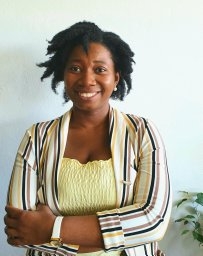
To support the delivery of an equitable and just transition, it is imperative to study models of ownership that can sustainably promote adoption. The aim of the study is to assess the benefits of co-operatively owned and operated storage systems. The underlying hypothesis is that there is a monetary and non-monetary value to residential storage. The hypothesis is built on the flexibility offered by storage as a demand response asset, which can be used by residents in price-based demand response programs and equally provides consumers with increased autonomy and reduced cost.
Vivian Ogechi Nwadiaru received her bachelor's in Metallurgical and Materials Engineering and an MS in Energy Engineering. Before joining UMass Amherst as a Ph.D. student, she completed an International Climate Protection Research Fellowship funded by the Alexander von Humboldt Foundation at the Technical University of Berlin and the University of Oxford, investigating Nigeria's energy transition and proliferation of fossil backup generators. Her research with ELEVATE explores equitable demand response strategies, such as pricing schemes for deploying solar and storage technologies to reduce cost and improve reliability in low-income communities.
Wednesday, October 26 | 12- 1 p.m. ET
"The Cultures of Energy Efficiency in Kharkiv (Ukraine) In the Times of War"
Viktoriia Grivina, PhD Candidate, University of St. Andrews
Moderator: Laura Ogden, Professor of Anthropology, Dartmouth College

On February 24, 2022 the Ukrainian city of Kharkiv, 40 km from the border with Russia, woke up on the frontline of the large-scale war. The rapid drop in population from 1.5 million to 800,000 and continuous damage inflicted to urban infrastructure led to visible and invisible transformations affecting local habits, the way the city looks, the way its services operate and more. In her talk, Viktoriia Grivina will reflect on some of the strategies that the local government, big and small businesses, transport and communal services, as well as the inhabitants remaining in Kharkiv, have adopted in order to minimize the consequences of the large- and small-scale destructions, energy crisis, and the persistent danger resulting from daily shelling and missile strikes targeting residential areas of the city.
Taking the perspective of a local resident, Grivina will highlight the changes in daily routines of the city, survival strategies and methods of adaptation, from window protection to the rule of the two walls, amendments to everyday routines, shopping, commute and preparations for the winter season. Analyzing these changes might help us better understand how war (and other crises) reveal critical energy issues in the city, flaws in its infrastructure and the potential for energy efficiency improvements.
Researcher, translator, writer, Viktoriia Grivina graduated from V.N. Karazin Kharkiv National University majoring in English and German Linguistics. In 2018-2020 she was awarded Erasmus Mundus Master's scholarship with Crossways in Cultural Narratives programme (Universities of Tubingen, St Andrews, and Bergamo). In 2020 Viktoriia presented her Master's dissertation (The Influence of Street Art on Community Development in Kharkiv, Ukraine). In September 2020, she joined the project "(Un)Archiving (Post)Industry" implemented by the Center for Urban History jointly with the University of St Andrews. In 2021 she started her PhD research at the University of St. Andrews, focusing on mythology, ecology and aesthetics in the city of Kharkiv in the times of war.
March 30: Priya Donti, PhD Candidate, Carnegie Mellon University
"Tackling Climate Change with Machine Learning"
Learn more about Priya Donti
View a recording of this talk
April 13: Churchill Agutu, ETH Zurich
"Scaling Off-Grid Technologies in Sub-Saharan Africa"
Learn more about Churchill Agutu
View a recording of this talk
April 27: June Lukuyu, UMass Amherst
"Power to Thrive: Stimulating Electricity Demand to Enhance Sustainable Human Development in Sub-Saharan Africa"
Learn more about June Lukuyu
View a recording of this talk
May 11: Maarten Brinkerink, University College Cork
"Assessing Global Climate Change Mitigation Scenarios from a Power System Perspective"
Learn more about Maarten Brinkerink
View a recording of this talk
May 25: Benedict Probst, ETH Zurich/Cambridge University
"Carbon Offsets: Problem or Panacea?"
Learn more about Benedict Probst
View a recording of this talk
January 19: Vivek Srikrishnan, Assistant Professor, Biological & Environmental Engineering, Cornell University
"Climate Risk, Uncertainty, and Coupled Energy Systems"
View a recording of this talk
Learn more about Dr. Srikrishnan
February 2: Joan Casey, Assistant Professor, Environmental Health Sciences, Columbia University
"Power Outage Preparedness, Duration, and Distribution: Spotlighting Environmental Justice"
View a recording of this talk
Learn more about Dr. Casey
February 16: Dominic Bednar, Presidential Postdoctoral Fellow, Arizona State University
"Towards Energy as a Human Right: A Multidimensional Exploration of State and Utility Level Disconnect Policies in the United State During COVID-19"
View a recording of this talk
Learn more about Dr. Bednar
March 2: Jorge Izar-Tenorio, Postdoctoral Research Associate, Carnegie Mellon University
"The Double Dividend of Irrigation and Electricity in East Africa"
View a recording of this talk
Learn more about Dr. Izar-Tenorio
September 15: Abel Gustafson, Associate Professor of Public Relations and Environmental Communication, University of Cincinnati
"Renewable Energy Public Opinion and Strategies for Effective Communication"
Learn more about Dr. Gustafson
View a recording of this talk
September 29: Daniel Møller Sneum, Post-Doctoral Researcher, Technical University of Denmark
"Flexible and Integrated Energy Systems — Finding and Addressing the Barriers"
Learn more about Dr. Møller Sneum
October 13: Danae Hernández-Cortés, Assistant Professor, Arizona State University
"Do Environmental Markets Cause Environmental Injustice? Evidence from California's Carbon Market"
Learn more about Dr. Hernández-Cortés
View a recording of this talk
October 27: Paige Weber, Assistant Professor, UNC Chapel Hill
"Equity Impacts of Markets for Clean Air"
Learn more about Dr. Weber
View a recording of this talk
November 10: Liz Allen, Research Development Officer, Northeastern University
"Envisioning the Future of Sharing in Electrical Energy Systems: Opportunities and Risks for Resilience, Sustainability & Equity"
Learn more about Dr. Allen
View a recording of this talk
July 14: Trisha Shrum, Assistant Professor of Community Development and Applied Economics, University of Vermont
"Endogenous Preferences, Intrinsic Motivation, and the Evolution of Pro-Environmental Behavior"
Learn more about Dr. Shrum
View a recording of this talk
July 21: Deidra Miniard, PhD. Candidate, Indiana University
"Shared Vision of a Decarbonized Future"
Learn more about Deidra Miniard
View a recording of this talk
April 7: Sarah Kelly, Postdoctoral Research Scholar, Dartmouth College Dept. of Anthropology
"Institutional Surprises in the Water-Energy Nexus: How Markets and Indigenous Territorial Conflicts Shape the Dynamics of Small Hydro Development in Chile"
Learn more about Sarah Kelly
View a recording of this talk
April 21: Michael Davidson, Assistant Professor School of Global Policy and Strategy/Department of Mechanical and Aerospace Engineering, University of California San Diego
"Carbon Neutrality in China: What's Behind the Numbers?"
Learn more about Michael Davidson
View a recording of this talk
May 19: Gregg Sparkman, Postdoctoral Research Associate, Andlinger Center for Energy and the Environment at Princeton University
"Progress on the 'Wicked' Problem: Overcoming Behavioral and Decision Making Hurdles to Address Climate Change and Decarbonize Society"
Learn more about Gregg Sparkman
View a recording of this talk
June 2: Nathan Williams, Assistant Professor at the Golisano Institute for Sustainability at the Rochester Institute of Technology
"Necessary but Not Sufficient: Unlocking the Impact of Electricity Access"
Learn more about Nathan Williams
View a recording of this talk
January 27: Deborah Seligsohn, Assistant Professor of Political Science at Villanova University
"Reframing US-China Climate Relations: Competition as the Key to Climate Mitigation"
Learn more about Dr. Seligsohn.
View a recording of Dr. Seligsohn's talk.
February 3: Sarah Jordaan, Assistant Professor of Energy, Resources, and Environment at the School of Advanced International Studies (SAIS), Johns Hopkins University
"Grid-Scale Life Cycle Assessment of Electricity Generation"
Learn more about Dr. Jordaan
View a recording of Dr. Jordaan's talk.
February 17: Elise Harrington, Assistant Professor in the Science, Technology, and Environmental Policy area, University of Minnesota
"Off-Grid Solar Distribution Models and Consumer Safeguards in Rural Kenya"
Learn more about Dr. Harrington
View a recording of Dr. Harrington's talk.
March 3: D. Cale Reeves, Visiting Assistant Professor at Georgia Institute of Technology's School of Public Policy
"Generating Insight from the Bottom Up: Agent-Based Modeling of Home Energy Technology Diffusion"
Learn more about Dr. Reeves
View a recording of Dr. Reeves' talk
March 17: Roman Sidortsov, Assistant Professor of Energy Policy at Michigan Technological University
"Stranded Assets, Path Dependencies & Carbon Lock-in: Implications of Oil & Gas Development in the Russian, Norwegian and U.S. Arctic"
Learn more about Dr. Sidortsov
View a recording of Dr. Sidortsov's talk
September 9: Stephanie Lenhart, Senior Research Associate at the Energy Policy Institute, Faculty in the School of Public Service, Boise State University
"Regional Electricity Market Governance and Market Rules for Energy Storage"
Learn more about Dr. Lenhart
View a recording of this talk
September 23: Erin Mayfield, Postdoctoral Scholar, Princeton University
"Prioritizing Social Equity in Infrastructure Transitions to Achieve Net Zero Emissions"
Learn more about Dr. Mayfield
View a recording of this talk
October 7: Steffi Muhanji and Wester Schoonenberg, Graduate Students, Dartmouth College
"Interdependent Energy Infrastructure Systems"
Learn more about Steffi Muhanji and Wester Schoonenberg
View a recording of this talk
October 21: Diana Hernandez, Assistant Professor, Sociomedical Sciences, Mailman School of Public Health, Columbia University
"Energy, Poverty and Health in a Changing Climate: Implications for Policy and Practice"
Learn more about Dr. Hernandez
View a recording of this talk
November 4: Saurabh Biswas, Post-doctoral Research Associate at the Center for Energy and Society, Arizona State University
"Understanding the Energy-Poverty Nexus: A Transdisciplinary Approach for Designing Sustainable Energy Transitions"
Moderator: Clark Miller, Arizona State University
Learn more about Dr. Biswas
View a recording of this talk
November 18: Tony Reames, Assistant Professor at the University of Michigan School for Environment & Sustainability
"An Incandescent Truth: Spatial, Racial and Socioeconomic Disparities in Residential Energy Efficiency"
Learn more about Dr. Reames
View a recording of this talk
June 3: Gabriel Chan, Assistant Professor, Humphrey School of Public Affairs, University of Minnesota
"Cooperative Electric Cooperative Research"
Learn more about Dr. Chan
View a recording of this talk
June 17: Bjarne Steffen, Senior Researcher and Lecturer, Energy Politics Group, ETH Zürich
"The Role of Finance in the Low-Carbon Energy Transition"
Moderator: Valerie Karplus, MIT Sloan School of Management
Learn more about Dr. Steffen
View a recording of this talk
July 1: Parth Vaishnav, Assistant Research Professor of Engineering & Public Policy, Carnegie Mellon University
"Electrify Everything"
Learn more about Dr. Vaishnav
View a recording of this talk
July 15: Rebecca Ciez, Postdoctoral Researcher, Columbia University
"Designing Energy Storage for Climate Goals"
Moderator: Jason Ren, Professor of Civil and Environmental Engineering; Acting Director, Andlinger Center for Energy and the Environment
Learn more about Dr. Ciez
View a recording of this talk
July 29: Michael Craig, Assistant Professor in Energy Systems, University of Michigan
"Electric Power Systems in a Changing Climate"
Learn more about Dr. Craig
View a recording of this talk
August 12: Destenie Nock, Assistant Professor, Civil and Environmental Engineering and Engineering & Public Policy, Carnegie Mellon University
"In-depth Analysis of Greenhouse Gas Emissions and Air Pollutants From Electric Transmission and Distribution (T&D) Systems"Moderator: Paulina Jaramillo, Carnegie Mellon University
Learn more about Dr. Nock
View a recording of this talk
August 26: Jesse Jenkins, Assistant Professor, Department of Mechanical and Aerospace Engineering and the Andlinger Center for Energy and Environment, Princeton University
"Clean Electricity: the Linchpin for a Net-Zero Economy"
Learn more about Dr. Jenkins
View a recording of this talk
This series is a collaborative effort between professors at Dartmouth College's Arthur L. Irving Institute for Energy and Society and the following colleges and universities: